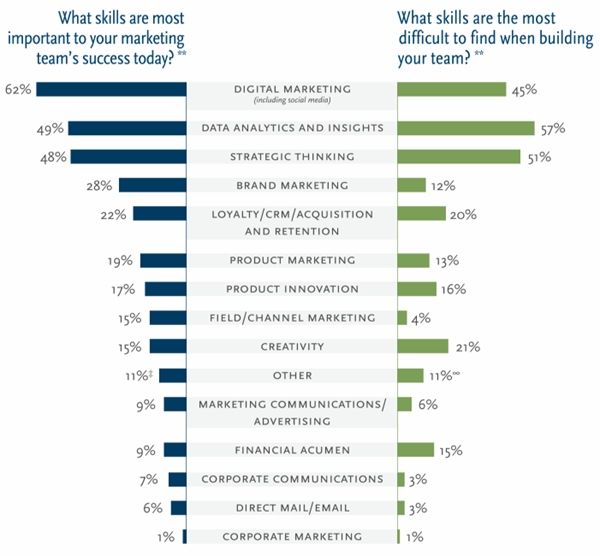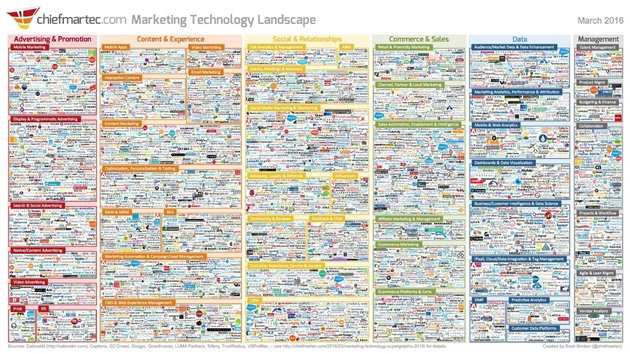We used to call it IT, now it's also Marketing. We used to call it Finance, now it's also Marketing. We used to call it Product, now it's also Marketing.
It used to be about marcom, now it's about martech.
You get where I'm going with this: Marketing isn't just marketing anymore; it's an integral part of everything else in organizations. And, more and more, Marketing's place is at the strategic helm, and marketing technology is a driving business force.
Today, staying relevant in a martech world affects everyone: It doesn't matter if you're the chief marketing officer, the chief marketing technologist, or an individual contributor on the team.
For many of us, it's scary, and there's no escaping it. In an age of algorithms and artificial intelligence (when computers can write pop songs), marketers don't just need to be tech-savvy... they need to be tech-everything—with a sprinkle of bot on top.
Today's In-Demand Marketing Skills
All this may sound like an exaggeration, but have you looked at job postings lately? Employers want the whole digital package: Marketing automation, CMS, and CRM; Google AdWords and Analytics; A/B-testing, user funnels, PPC, SEO, SEM, HTML, CSS; social media and email (of course); UX design, mobile marketing, SMS; and, while we're at it let's throw in Adobe Illustrator, Photoshop, and InDesign.
Don't get me wrong, there are people who do all of that (competently) and bless you if you're one of them. But, on the other hand, are employers out of their minds? Is Jack-of-All-Martech-Trades here to stay? And, how do we keep up?
For creative people like me, staying relevant in a martech world can be scary. The reality is, martech proficiency is something many of us strive for but can't fully achieve. "The most in-demand skills by marketing directors and hiring managers are data analysis, SEO, SQL, Google Analytics, and HTML," according to research, and 45% of all job listings included a desire for the candidate to have at least some ability to analyze data, but only 3% of marketing LinkedIn profiles included mentions of data skills.
Likewise, a 2016 survey of CMOs found that digital marketing and data analytics are the most in-demand skills—and also the most difficult skills to recruit.

Hmm. So employers want it, but marketers don't have it. Technology is outpacing our ability as marketers to acquire "desired" martech skills. As Digital Marketing Institute co-founder and director Ian Dodson explains, "We're seeing a worrying trend in digital marketing skills. Even though digital marketing has become increasingly essential for businesses, there is a persistent, and growing, global skills gap that threatens to undermine future organizational growth. In the United States alone, 45% of marketers cite a lack of in-house expertise as one of their greatest challenges, and there is an urgent need for digital skills education for professionals."
Martech Landscape Expansion
I'm not done yet.
In the last five years, martech has undergone epic growth—from about 150 marketing technology providers in 2011 to more than 3,800 as of March 2016.
Look at the following infographic by Scott Brinker that captures the mind-boggling 2016 martech landscape—nearly double that of 2015. Imagine what 2017 will look like... No wonder there's a skills gap!
I rest my case. And rest assured, if you're not keeping pace—you're not alone. Even the most digital-savvy marketers may not keep up.
What you can do is stay martech-relevant and martech-literate in your industry or niche—while acquiring a general understanding of what's happening in the larger martech world.
10 Basic Ways to Get Martech-Savvy and Stay Relevant in a Time of Martech Madness
- Make a plan. Do the research and form a personal plan for what you want to accomplish (certifications, training, proficiencies relevant to your profession) and how you're going to get there.
- Make time. Ah... the one thing we don't have. Make learning part of your daily or weekly ritual. Block out the time and dedicate a few hours. Easier said than done, but learning takes time, especially if it's not being acquired on the job.
- Get on-the-job training. Put me in coach! Let your manager or employer know that you want to gain experience in a certain area of martech—maybe a small project, taking on new responsibilities, hands-on exposure to platforms, etc.
- Check your ego. Taking on a "lower level" project or position is not ideal, but it can be a good way to get a foot in the martech door. As a freelancer, I've discounted my hourly rate many times just to gain experience. Keep in mind expectations are rising for senior-level marketers and executives to possess technology skills.
- Get useful certifications. There's a certification for anything martech these days. Everyone wants them, but what good are they if you don't use or retain the information? Figure out which ones are relevant, and focus on a couple. (Check out this list of free and paid marketing certifications.)
- Network. Some people love to network. I am not one of those people. But, I understand the importance of networking events and opportunities. Networking can help you meet and build connections with other people in your profession who are tackling similar issues—or have insight on different approaches for staying relevant in your space.
- Use it or lose it. Use technology in your daily life so you don't get left behind. I'm not a fan of Facebook; it's like falling into some addictive and hypnotic time warp with your subconscious begging you to get out. I don't particularly like to tweet, either, and I tweet only if it's relevant (that's why I have almost no followers). But self-deprecation aside, I do it because, as a marketer, I need to understand mainstream technology first-hand. Living vicariously through my 13-year-old also helps.
- Follow influencers. I use LinkedIn not just for networking but also for keeping up with relevant influencers. Seeing what your influencers are sharing can help you stay abreast of what's happening in your specific industry or profession.
- Subscribe to industry newsletters. Just a few, and that's it. Any more than 2-3 is overwhelming. To make sure you're not missing out, check your Twitter feed, but don't overwhelm your inbox.
- Have confidence. Don't underestimate your skills and abilities. Reflect on past projects and you may discover that you have more technology experience than you realize—like list management, integrated campaigns, Excel, Salesforce, etc. It may sound like grasping for straws (and maybe it is), but it also just might be the one relatable example needed to get you in the door somewhere.
Bottom line: turning a martech obstacle into a career opportunity requires both mindset and work. So chin up, buttercup! Turn that "too far behind to catch-up" attitude into a "just keep swimming" mentality and focus on steps, not finish line—because there isn't one.
Build a personal plan and be realistic and selective about what you can accomplish. For example, Google AdWords Fundamentals has given me insight into SEO practices that help me be a better digital copywriter and content marketer. Getting to know WordPress has helped me understand the backend of a CMS. They are small things, but they can have big impact on my ability to meet client expectations.
Martech is a reality-check we all have to face, and having a personal plan can keep you in the game.
What About Creativity?
I leave you with this: Creativity still counts. In a recent study of marketers across the US and Europe, understanding marketing technology was ranked only behind creativity as an increasingly important skill for successful senior marketers.
As Scott Brinker puts it, " Marketing technology by itself isn't the singular secret to marketing success. Creativity matters more—how you apply that technology in the service of brilliant and compelling campaigns, programs, and customer touchpoints."
What are you doing to stay relevant? Comment and join the conversation, below.





